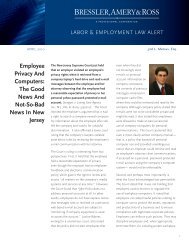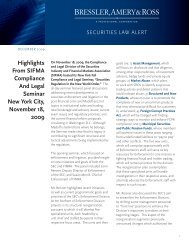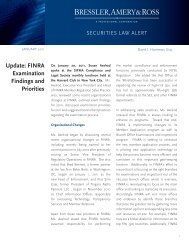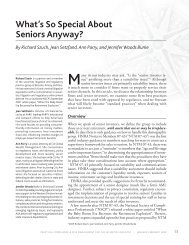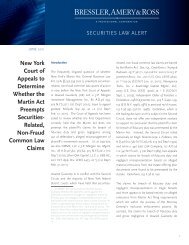NJ Lawyer Magazine - Bressler, Amery & Ross
NJ Lawyer Magazine - Bressler, Amery & Ross
NJ Lawyer Magazine - Bressler, Amery & Ross
Create successful ePaper yourself
Turn your PDF publications into a flip-book with our unique Google optimized e-Paper software.
Vacating and Confirming Arbitration Decisions<br />
Under the New Jersey Arbitration Act of 2003<br />
by Brian J. Ellis<br />
Arbitration continues to replace<br />
litigation as a means for dispute<br />
resolution. Increasingly, commercial<br />
agreements include arbitration<br />
provisions, which courts continue to<br />
interpret broadly. 1 Indeed, it is “the<br />
long-standing policy” of New Jersey<br />
courts “to favor arbitration as a speedy<br />
and efficient approach to dispute<br />
resolution.” 2<br />
Arbitration provisions typically include language<br />
ostensibly covering “all transactions”<br />
or “any dispute arising from” the parties’<br />
relationship. A party contesting the validity<br />
of an arbitration provision faces a formidable<br />
challenge. In close cases, courts are to err<br />
on the side of ordering arbitration. 3<br />
This article is written for attorneys and clients who are<br />
emerging from arbitration, in receipt of an award (either good<br />
or bad), and wondering what to do next. The discussion<br />
below considers the processes of both confirming and appealing<br />
arbitration decisions under the New Jersey Arbitration Act<br />
of 2003. 4<br />
Arbitration: Background<br />
Pursuant to prior contractual agreements, parties may be<br />
required to submit their disputes to arbitration forums such as<br />
the American Arbitration Association (AAA), Judiciary Arbitration<br />
and Mediation Services (JAMS), and the Financial Industry<br />
Regulatory Authority (FINRA). Each forum has its own<br />
procedural rules and interpretive guidance. By submitting a<br />
dispute to a particular forum, parties agree to abide by that<br />
forum’s procedural rules. However, in certain circumstances,<br />
parties may agree to modify the procedural rules.<br />
Typically, parties select an arbitrator from a pool of individuals<br />
with varied experience, education, and expertise. Arbitrators<br />
are generally compensated neutrals who need not be<br />
judges or attorneys. They need only satisfy the forum’s<br />
requirements to serve as an arbitrator. Once chosen and confirmed,<br />
the arbitrator’s decisions will be final and binding.<br />
The arbitration process can seem foreign to some. Attorneys<br />
may be unfamiliar with the procedural rules, and may<br />
find certain informalities of the arbitration process frustrating.<br />
Clients may not understand the process. When the matter<br />
has concluded, some may be perplexed by the arbitrator’s<br />
decision, which may not include any written explanation or<br />
reasoning.<br />
The Award<br />
The arbitration award represents the end result of a dispute<br />
resolution process that is designed to be inexpensive, efficient,<br />
and final. As a counterbalance to the increased efficiency,<br />
parties contractually agree to waive the right to a jury trial<br />
and must operate under procedural rules that may permit<br />
only limited discovery or motion practice.<br />
An arbitration award may be a single page containing<br />
nothing more than an order directing one party to pay the<br />
other. Arbitrators are not bound by legal precedent and need<br />
not provide a written opinion or rationale for their decision.<br />
An arbitrator’s misapplication of the law or violation of the<br />
rules of evidence will not generally rise to the level of appealable<br />
error.<br />
In cases where no rationale is given for an award, a court<br />
reviews the award only to determine if there is a rational basis<br />
for it. “Monetary awards will be upheld as long as such awards<br />
bear a logical relationship to the evidence or as long as there<br />
is a rational basis therefore.” 5 As one federal appellate court<br />
stated, “[t]he onus is on the party requesting the vacatur...to<br />
WWW.<strong>NJ</strong>SBA.COM NEW JERSEY LAWYER | April 2011 69
efute every rational basis upon which<br />
the arbitrator could have relied.” 6<br />
Vacating the Award<br />
The Process<br />
Courts will not disturb an arbitrator’s<br />
decision unless a contestant can show<br />
that certain statutory grounds for<br />
vacatur exist. A party may seek vacatur<br />
by filing a summary action in the superior<br />
court for the county in which the<br />
arbitration proceeding was conducted.<br />
A party has 120 days from the date of<br />
notice of the award to initiate an action<br />
to vacate the award. 7 A party alleging<br />
the award was procured by fraud or corruption<br />
must file within 120 days from<br />
the date the movant knew or should<br />
have known of the fraud. 8<br />
The Standard<br />
Judicial review of an arbitrator’s decision<br />
is “extremely narrow.” 9 The arbitrator’s<br />
decision “will not be set aside<br />
merely because the court would have<br />
decided the facts or construed the law<br />
differently.” 10 Indeed, the burden is<br />
heavy for the party seeking to appeal<br />
from an arbitrator’s decision. Appellants<br />
should be cautioned because courts<br />
have sanctioned parties for appealing<br />
arbitration awards without reasonable<br />
grounds for doing so. 11<br />
Potential Sanctions for Frivolous<br />
Vacatur Motions<br />
Federal and state courts have exhibited<br />
intolerance toward vacatur actions<br />
filed without a reasonable basis. In B.L.<br />
Harbert International, LLC v. Hercules Steel<br />
Co., 12 the 11th Circuit issued the following<br />
warning:<br />
When a party who loses an arbitration...drags<br />
the dispute through the<br />
court system without an objectively<br />
reasonable belief it will prevail, the<br />
promise of arbitration is broken. Arbitration’s<br />
allure is dependent upon the<br />
arbitrator being the last decision<br />
70 NEW JERSEY LAWYER | April 2011<br />
maker in all but the most unusual<br />
cases....[T]he parties must be able to<br />
trust that the arbitrator’s decision will<br />
be honored sooner instead of later.<br />
Courts cannot prevent parties from<br />
trying to convert arbitration losses into<br />
court victories, but it may be that we<br />
can and should insist that if a party on<br />
the short end of an arbitration award<br />
attacks that award in court without<br />
any real legal basis for doing so, that<br />
party should pay sanctions.<br />
[T]his Court is exasperated by those<br />
who attempt to salvage arbitration<br />
losses through litigation that has no<br />
sound basis in the law applicable to<br />
arbitration awards. The warning this<br />
opinion provides is that in order to further<br />
the purposes of the [Federal Arbitration<br />
Act] and to protect arbitration<br />
as a remedy we are ready, willing, and<br />
able to consider imposing sanctions in<br />
appropriate cases.<br />
Pennsylvania’s highest court recently<br />
condemned a pro se plaintiff’s vacatur<br />
motion, holding that the motion was an<br />
attempt “to unreasonably extend” the<br />
proceedings and to “advance frivolous<br />
arguments.” 13 The Court sanctioned the<br />
pro se plaintiff, ordering that he pay the<br />
defendant’s attorney’s fees, costs, and<br />
damages. 14 There is no reason why New<br />
Jersey courts could not interpret N.J.S.A.<br />
2A:15-59 and Rule 1:4-8 to provide for<br />
the imposition of sanctions for frivolous<br />
attempts to vacate an arbitration award. 15<br />
Grounds for Vacatur<br />
The New Jersey Arbitration Act of 2003<br />
In 2003, the state of New Jersey<br />
enacted the New Jersey Arbitration Act<br />
(<strong>NJ</strong>AA). 16 The <strong>NJ</strong>AA “recognizes the contractual<br />
nature of the arbitration remedy<br />
and sets forth the details of the arbitration<br />
procedure that will apply unless<br />
varied or waived by contract.” 17<br />
“The <strong>NJ</strong>AA precludes judicial interference<br />
with an arbitrator’s award<br />
except in extremely limited circum-<br />
stances.” 18 Under the <strong>NJ</strong>AA, a court will<br />
vacate an arbitration award only if:<br />
(1) the award was procured by corruption,<br />
fraud, or other undue means;<br />
(2) the court finds evident partiality<br />
by an arbitrator; corruption by an arbitrator;<br />
or misconduct by an arbitrator<br />
prejudicing the rights of a party to the<br />
arbitration proceeding;<br />
(3) an arbitrator refused to postpone<br />
the hearing upon showing of<br />
sufficient cause for postponement,<br />
refused to consider evidence material<br />
to the controversy, or otherwise conducted<br />
the hearing contrary to section<br />
15 of this act, so as to substantially<br />
prejudice the rights of a party to the<br />
arbitration proceeding;<br />
(4) an arbitrator exceeded the arbitrator’s<br />
powers;<br />
(5) there was no agreement to arbitrate,<br />
unless the person participated in<br />
the arbitration proceeding without<br />
raising the objection pursuant to subsection<br />
c. of section 15 of this act not<br />
later than the beginning of the arbitration<br />
hearing; or<br />
(6) the arbitration was conducted<br />
without proper notice of the initiation<br />
of an arbitration as required in section<br />
9 of this act so as to substantially prejudice<br />
the rights of a party to the arbitration<br />
proceeding. 19<br />
A modification of the award may be<br />
ordered by the court if:<br />
(1) there was an evident mathematical<br />
miscalculation or an evident mistake in<br />
the description of a person, thing,<br />
or property referred to in the award;<br />
(2) the arbitrator made an award on a<br />
claim not submitted to the arbitrator<br />
and the award may be corrected without<br />
affecting the merits of the decision<br />
upon the claims submitted; or<br />
(3) the award is imperfect in a matter<br />
of form not affecting the merits of the<br />
decision on the claims submitted. 20<br />
WWW.<strong>NJ</strong>SBA.COM
Manifest Disregard of the Law<br />
As stated, arbitrators are not bound<br />
by legal precedent, nor must they adhere<br />
to state or federal evidentiary rules.<br />
However, where a party can demonstrate<br />
the arbitrator knowingly misapplied or<br />
disregarded the law, a party may attempt<br />
to seek vacatur under the manifest disregard<br />
of the law doctrine.<br />
While the doctrine has not generally<br />
been recognized by New Jersey courts, 21<br />
it provides compelling grounds for<br />
invalidating an arbitrator’s decision in<br />
appropriate cases. The manifest disregard<br />
of the law doctrine is comprised of<br />
two elements. As one Law Division<br />
court explained:<br />
One element looks to the result<br />
reached in arbitration and evaluates<br />
whether it is clearly consistent or inconsistent<br />
with controlling law. For this<br />
element to be satisfied, a reviewing<br />
court must conclude that the arbitrator<br />
misapplied the relevant law touching<br />
upon the dispute before her in a manner<br />
that constitutes something akin to<br />
a blatant, gross error of law that is<br />
apparent on the face of the award.<br />
The other element of the “manifest<br />
disregard of the law” standard<br />
requires a reviewing court to evaluate<br />
the arbitrator’s knowledge of the relevant<br />
law. Even if a reviewing court<br />
finds a clear error of law, vacatur is<br />
warranted under the “manifest disregard<br />
of the law” ground only if the<br />
court is able to conclude that the arbitrator<br />
knew the correct law but nevertheless<br />
“made a conscious decision” to<br />
ignore it in fashioning the award. 22<br />
While not prevalent in New Jersey,<br />
New York courts have demonstrated a<br />
willingness to vacate arbitration awards<br />
under the manifest disregard of the law<br />
doctrine. 23 One would expect that, given<br />
an appropriate case, New Jersey courts<br />
may find occasion to apply the doctrine.<br />
WWW.<strong>NJ</strong>SBA.COM<br />
Confirming the Award<br />
Confirmation of an arbitration award<br />
transforms it into an enforceable judgment.<br />
In most cases, a party in receipt of<br />
a monetary award must seek confirmation<br />
in order to enforce the award<br />
against the other party. For arbitrations<br />
conducted in New Jersey, parties may<br />
seek confirmation by initiating a summary<br />
action in the superior court for the<br />
county in which the arbitration was<br />
conducted. An arbitration award will<br />
also be confirmed where an action to<br />
vacate the award fails. 24<br />
Concluding Thoughts: Preserve the<br />
Record<br />
When considering an appeal from an<br />
arbitration award, a court will review<br />
the record of the arbitration proceedings.<br />
Therefore, parties should be diligent<br />
to create and preserve the record of<br />
the arbitration proceeding throughout<br />
the arbitration process. When applicable,<br />
a party should request a certified<br />
transcription of the arbitration hearing<br />
and keep track of all documents, correspondence,<br />
pleadings, filings, and<br />
exhibits related to the arbitration.<br />
Courts have rejected vacatur motions<br />
where no record or transcript was available.<br />
25 The Appellate Division recently<br />
reversed an order vacating an arbitration<br />
decision where no record of the arbitration<br />
proceeding was available for<br />
review. 26 The court noted that the arbitration<br />
“was conducted without being<br />
formally recorded,” and that there was<br />
no transcript. 27 The court stated that, in<br />
arriving at its decision to reverse the<br />
vacatur order, it did not consider “representations<br />
in the briefs for which there is<br />
no record support.” 28 Instead, the court<br />
“only considered the documentary<br />
record set forth in the appendices.” 29<br />
Where grounds for vacatur are present,<br />
diligence in preserving the record of<br />
the arbitration proceedings may be critical<br />
to a successful appeal.<br />
Endnotes<br />
1. See, e.g., Garfinkel v. Morristown<br />
Obstetrics & Gynecology Assocs., P.A.,<br />
168 N.J. 124, 137 (2001)(“As a general<br />
rule, courts have construed broadly<br />
worded arbitration clauses to<br />
encompass[ ] tort, as well as contract<br />
claims”); EPIX Holdings Corp. v. Marsh<br />
& McLennan Companies, Inc., 410 N.J.<br />
Super. 453, 477 (App. Div. 2009)<br />
(“[W]hen phrases such as ‘arising<br />
under’ and ‘arising out of’ appear in<br />
arbitration provisions, they are normally<br />
given broad construction, and<br />
are generally construed to encompass<br />
claims going to the formation of<br />
the underlying agreements.”).<br />
2. Malik v. Ruttenberg, 398 N.J. Super.<br />
489, 494-495 (App. Div. 2008); see<br />
also Fawzy v. Fawzy, 199 N.J. 456,<br />
468 (2009) (“Our courts have long<br />
noted our public policy that encourages<br />
the use of arbitration proceedings<br />
as an alternative forum.”).<br />
3. See Moses H. Cone Memorial Hospital v.<br />
Mercury Construction Corp. 460 U.S. 1,<br />
24-25 (1983) (“[A]s a matter of federal<br />
law, any doubts concerning the<br />
scope of arbitrable issues should be<br />
resolved in favor of arbitration,<br />
whether the problem at hand is the<br />
construction of the contract language<br />
itself or an allegation of waiver, delay,<br />
or a like defense to arbitrability”); see<br />
also Yale Materials Handling Corp. v.<br />
White Storage & Retrieval Systems, 240<br />
N.J. Super. 370, 375 (App. Div. 1990)<br />
(“New Jersey law [is] consonant with<br />
federal law which liberally enforces<br />
arbitration agreements.”).<br />
4. N.J.S.A. 2A:23b-1 et seq.<br />
5. McHugh Inc. v. Soldo Const. Co., Inc.,<br />
238 N.J. Super. 141, 147 (App. Div.<br />
1990) (citing Benjamin F. Shaw Co. v.<br />
Cincinnati Gas & Elect. Co., 633 F.<br />
Supp. 841, 843 (S.D.Oh. 1986)).<br />
6. Brown v. Rauscher Pierce Refsnes, Inc.,<br />
994 F.2d 775, 779 (11th Cir. 1993).<br />
7. N.J.S.A. 2A:23B-23(b).<br />
8. Id.<br />
NEW JERSEY LAWYER | April 2011 71
9. Korshalla v. Liberty Mutual Ins. Co.,<br />
154 N.J. Super. 235, 240 (Law Div.<br />
1977).<br />
10. Carpenter v. Bloomer, 54 N.J. Super.<br />
157, 168 (App. Div. 1959).<br />
11. See infra notes 12-14 and accompanying<br />
text.<br />
12. 441 F.3d 905, 913-14 (11th Cir.<br />
2006) (regarding motions to vacate<br />
arbitration awards under the Federal<br />
Arbitration Act (9 U.S.C. § 1 et seq.)).<br />
13. U.S. Claims, Inc. v. Dougherty, 914 A.2d<br />
874, 879-80 (Pa. Super. Ct. 2006).<br />
14. Id.<br />
15. N.J.S.A. 2A:15-59.1 (frivolous causes<br />
of action) and R. 1:4-8 (frivolous litigation)<br />
provide for the imposition<br />
of sanctions, including reasonable<br />
litigation costs and attorneys’ fees.<br />
16. The focus of this article is limited to<br />
proceedings conducted under the<br />
provisions of the <strong>NJ</strong>AA. Arbitration<br />
of disputes arising from a collective<br />
bargaining agreement or a collectively<br />
negotiated agreement continues<br />
to proceed under N.J.S.A. 2A:24-<br />
1 et seq., which is not the purview of<br />
this article.<br />
17. Fawzy v. Fawzy, 199 N.J. 456, 470<br />
(2009).<br />
18. Malik v. Ruttenberg, 398 N.J. Super.<br />
72 NEW JERSEY LAWYER | April 2011<br />
489, 495 (App. Div. 2008).<br />
19. Fawzy, 199 N.J. at 470 (citing N.J.S.A.<br />
2A:23B-23(a)).<br />
20. Id. (citing N.J.S.A. 2A:23B-4).<br />
21. At least one New Jersey court has<br />
concluded that “a manifest disregard<br />
of the law does not provide a<br />
basis to vacate or modify an arbitration<br />
award.” 700 Gotham, LLC v. J.<br />
Manheimer, Inc., No. BER-L-673-05,<br />
2005 WL 1017593, at *2 n.3 (N.J.<br />
Super. Law Div. March 24, 2005).<br />
22. Liberty Mut. Ins. Co. v. Open MRI of<br />
Morris & Essex, L.P., 356 N.J. Super.<br />
567, 582-84 (Law Div. 2002) (internal<br />
citations omitted).<br />
23. See Barclays Capital Inc. v. Shen, No.<br />
111720/07, 2008 NY Slip Op 28146<br />
(N.Y. Sup. Ct. 2008) (“It is beyond<br />
dispute that the panel was familiar<br />
with the Rosenberg II decision. The<br />
decision and its impact on the pending<br />
arbitration had been vigorously<br />
argued before the panel in both oral<br />
and written motions by petitioner....Thus,<br />
the court holds that this is<br />
one of those rare cases where the<br />
panel, aware of the applicable law<br />
and attendant public policy considerations,<br />
chose to ignore it. The two<br />
prongs of the manifest disregard<br />
doctrine are satisfied in this case.”).<br />
24. N.J.S.A. 2A:23B-23d (“If the court<br />
denies an application to vacate an<br />
award, it shall confirm the award<br />
unless an application to modify or<br />
correct the award is pending.”).<br />
25. The Appellate Division has rejected<br />
attempts to vacate awards even where<br />
the record of the underlying arbitration<br />
had not been provided. See, e.g.,<br />
Riccio v. Riccio, Docket: A-2805-05T2 at<br />
*5 (Feb. 27, 2007) (rejecting vacatur<br />
motion where none of a moving<br />
party’s contentions “could possibly<br />
have warranted vacation of the arbitration<br />
award under <strong>NJ</strong>SA 2A:23B-23”).<br />
26. Preferred Warranties, Inc. v. Fialkowski,<br />
No. A-1508-06T5, 2007 N.J.<br />
Super. Unpub. LEXIS 2253 (App.<br />
Div. Dec. 7, 2007).<br />
27. Id. at *1 n. 1.<br />
28. Id.<br />
29. Id.<br />
Brian Ellis is an associate in the securities<br />
litigation and regulatory practice group in<br />
the Florham Park office of <strong>Bressler</strong>, <strong>Amery</strong> &<br />
<strong>Ross</strong>, P.C. His practice includes multi-state<br />
advocacy on behalf of organizations and<br />
individuals before arbitration panels, regulatory<br />
bodies, and state and federal courts.<br />
WWW.<strong>NJ</strong>SBA.COM
This article was originally published in the April 2011 issue of New Jersey <strong>Lawyer</strong> <strong>Magazine</strong>, a<br />
publication of the New Jersey State Bar Association, and is reprinted here with permission.<br />
NEW JERSEY LAWYER | April 2011 WWW.<strong>NJ</strong>SBA.COM



